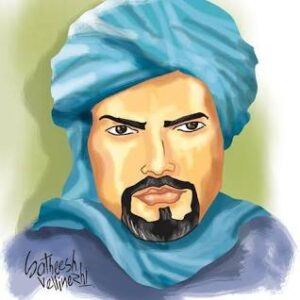Ibn Battuta traveled around the world for 29 years during the Middle Ages. During his journey he traveled some 75,000 miles spanning most of the Islamic Empire and beyond. He is considered one of the greatest travelers in world history.
Ibn Battuta Overview:
| Occupation | Traveler and Explorer |
| Nationality | Moroccan |
| Born | February 25, 1304 in Tangier, Morocco |
| Died | 1369 in Morocco |
| Best known for | One of the greatest travelers in history |
Biography of Ibn Battuta:
How do we know about Ibn Battuta?
When Ibn Battuta returned to Morocco in his later years in 1354, he told many stories of his wonderful voyages abroad. The Moroccan ruler wanted a record of Ibn Battuta’s travels and insisted that scholars tell the story of his travels. Scholars wrote down the records, from which came the famous travel book called Leela, which means “journey.”
Where did Ibn Battuta grow up?
Ibn Battuta was born in Tangier, Morocco on February 25, 1304. At the time, Morocco was part of the Islamic Empire and Ibn Battuta was raised in a Muslim household. He probably spent his youth in Islamic schools, studying reading, writing, science, mathematics, and Islamic law.
Hajj
When Ibn Battuta was 21 years old, he decided it was time to make a pilgrimage to Mecca, the holy city of Islam. He knew this would be a long and arduous journey, but said goodbye to his family and set off alone.
The journey to Mecca spanned thousands of kilometers. He traveled all over North Africa, usually joining caravans to keep people company and keep them safe. On his way he visited such cities as Tunis, Alexandria, Cairo, Damascus and Jerusalem. A year and a half after leaving home, he finally reached Mecca and completed his pilgrimage.
Travels
Ibn Battuta discovered his love of travel during his pilgrimage. He loved seeing new places, learning about other cultures and meeting new people. He decided to travel further.
For about 28 years, Ibn Battuta traveled around the world. He first visited Iraq and Persia, then part of the Silk Road and cities such as Baghdad, Tabriz and Mosul. He then traveled along the east coast of Africa, spending time in Somalia and Tanzania. After seeing much of the African coast, he returned to Mecca for the Hajj.
Ibn Battuta then traveled north, visiting Anatolia (Turkey) and the Crimea. He visited the city of Constantinople and then headed east to India. In India he worked as a judge to the King of Delhi. A few years later he left the country and continued his journey to China. In 1345 he arrived in Quanzhou, China.
During his stay in China, Ibn Battuta visited cities such as Beijing, Hangzhou and Guangzhou. He traveled the Grand Canal, visited the Great Wall, and met Mongol Khan, who ruled China. After spending more than a year in China, Ibn Battuta decided to return to Morocco.
As he was arriving home, a messenger informed him that his parents had died in his absence. He continued his travels without returning home. He traveled north to Al-Andalus (Muslim Spain), then returned south to the heart of Africa, visiting Mali and the famous African city of Timbuktu.
Later Life and Death
Finally, in 1354 Ibn his Battuta returned to Morocco. He told the story of his adventures to scholars, who wrote it all down in a book called “Leela.” He then stayed in Morocco and worked as a judge until his death around 1369.
Interesting Facts about Ibn Battuta
His voyages covered his 44 modern countries.
During his travels, he often acted as a kadi (judge of Islamic law) in various places.
During his travels he married several times and had several children as well. While traveling, he was chased by bandits and robbed.
He was able to escape (wearing only his pants) and then caught up with the rest of the group.
He lived primarily on the gifts and hospitality of his fellow Muslim followers.
Some historians doubt whether Ibn Battuta actually visited all the places mentioned in his writings.


